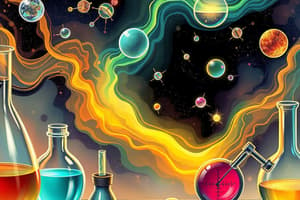Podcast
Questions and Answers
What is chemistry?
What is chemistry?
What is the scientific method?
What is the scientific method?
Define qualitative data in chemistry.
Define qualitative data in chemistry.
General statements about one's observation on the system.
What is mass?
What is mass?
Signup and view all the answers
What is the state of matter where molecules are free to move randomly in different directions and are easy to compress?
What is the state of matter where molecules are free to move randomly in different directions and are easy to compress?
Signup and view all the answers
Study Notes
What is Chemistry?
- Chemistry is the branch of science that deals with the study of matter and its processes.
- It is the basis of other engineering sciences such as biology, physics, thermodynamics, and others.
The Scientific Method
- The scientific method is a systematic approach to research used in almost all types of engineering sciences.
- It involves defining a problem, making experiments, collecting data, interpreting the data, formulating a hypothesis, and summarizing the data in a simple and precise way.
Data
- Data refers to the raw information collected from experiments.
- Once organized, data is referred to as results.
- Conclusions are made by making deductions from the results.
Types of Data
- Qualitative Data: general statements about observations on a system, e.g. color, odor, shape.
- Quantitative Data: numbers obtained by measuring certain parameters of a system, e.g. mass, length, volume.
Branches of Chemistry
- Organic Chemistry: study of chemical substances with carbon-carbon bonds, e.g. Pharmaceuticals, plastics.
- Inorganic Chemistry: study of chemical substances without carbon-carbon bonds, e.g. metals, minerals, semiconductors.
- Physical Chemistry: study of behavior and changes of matter and related energy changes, e.g. reaction rates, reaction mechanisms.
- Analytical Chemistry: study of different components and composition of substances, e.g. food nutrients.
- Biochemistry: study of matter and processes in living organisms, e.g. metabolism, fermentation.
Summarizing Data
- Hypothesis: a statement produced out of few observations without much experimental evidence.
- Law: a statement produced out of thorough research and experimentation that indicates the relationships between different phenomena.
- Theory: a unifying principle that explains a body of facts and/or laws.
Matter
- Anything that has mass and occupies space.
- Mass is a measurement of the amount of matter in a certain object.
States of Matter
- Solid: molecules closely held together, rigid, almost incompressible.
- Liquid: molecules further apart, can flow, follows the shape of its container, hard to compress.
- Gas: molecules separated by large distances, free to move randomly, flows, easy to compress.
Studying That Suits You
Use AI to generate personalized quizzes and flashcards to suit your learning preferences.
Description
Learn the basics of chemistry, the branch of science that deals with matter and its processes, and the scientific method, a systematic approach to research in engineering sciences.




